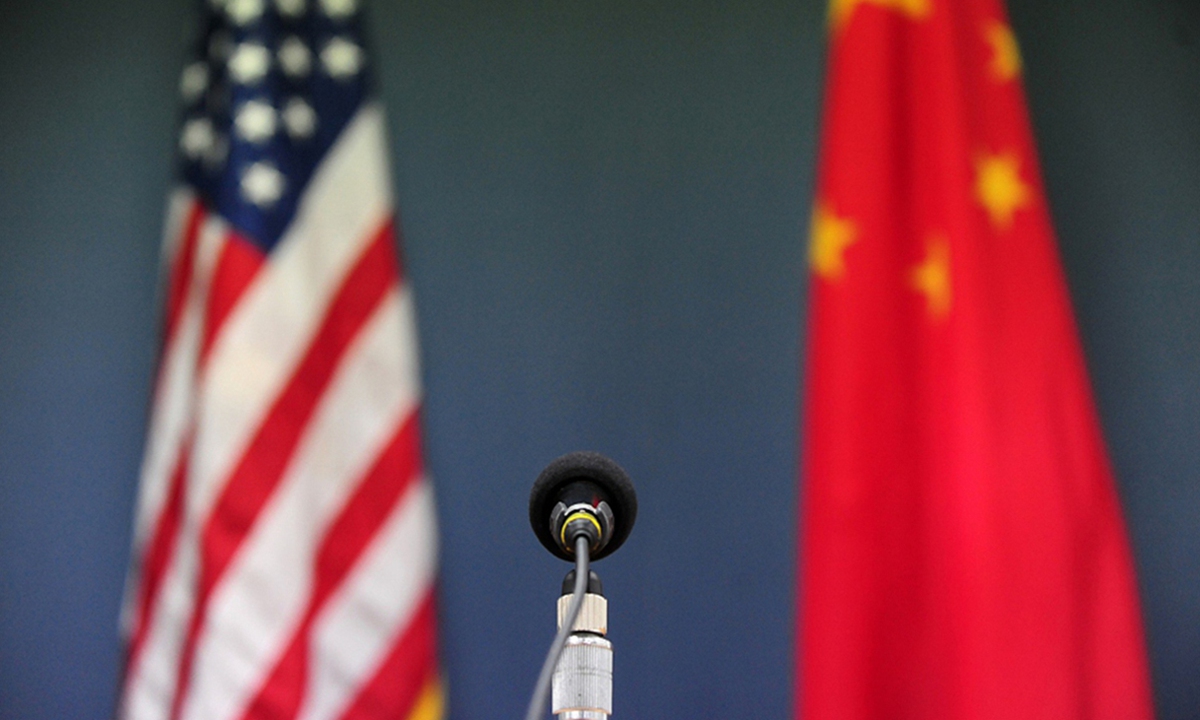US seeks to advance high-level exchanges but 'sincerity needed'
Raimondo's planned visit 'a touchstone' to see if ties could truly be eased

China US Photo: VCG
China and the US continue to maintain the momentum of high-level engagement, with US Commerce Secretary Gina Raimondo unveiling plans to visit China "later this summer," media reported, following successive visits by high-level US officials to Beijing. However, US Secretary of State Antony Blinken continued to slander China's image during his latest trip to the Pacific, even as he emphasized the importance of managing US-China relations in a responsible way, which reflects the duplicity of Washington's China policy, experts said.
Although the resumption of high-level exchanges has helped bring back some cooperation between the two countries in areas such as climate change and possibly counternarcotics, experts said Raimondo's visit could be a "true touchstone" to see if there is any substantial easing of tensions or US officials are merely paying "lip service" to the strained bilateral relations.
Some experts warned that the two countries are now at a critical stage of managing their differences, as there are huge challenges to be faced if bilateral ties are to be prevented from spiraling down given that the US could take unfriendly and even dangerous moves to damage relations, especially when competition is still the mainstay the US' China policy. Domestic factors including the dominance of the Republicans in US Congress and upcoming campaign season are seen as the biggest stumbling blocks to the Biden administration's flexibility in its China policy.
'Touchstone'
Blinken pledged to step up support for Pacific island nations during his visit to Nuku'alofa, Tonga on Wednesday. He is the first US Secretary of State to pay an official visit to Tonga. He also raised a warning about aid from China, calling its so-called militarization of the South China Sea and "economic coercion" as problematic behavior, according to media reports.
"Using these expressions is typical proof that the US has no bottom line in its China policy. The US' diplomacy in the Asia-Pacific region on China-related topics is highly hypocritical," Li Haidong, a professor at the China Foreign Affairs University, told the Global Times on Wednesday.
By claiming that it can effectively manage divergences with China, the US is trying to confuse the Pacific countries and project a bad image of China, undermining the foundation of bilateral cooperation and "sowing the seeds" of mistrust about China in the region, Li said.
Following a decision by China's top legislature to remove Qin Gang as foreign minister, appointing top diplomat Wang Yi as foreign minister, both Blinken and the US State Department vowed to continue engaging with the Chinese side.
"Top legislature's decision on foreign minister does not mean any change in our foreign policy. China's US policy has been consistent as we always seek constructive and stable relations with the US," Lü Xiang, research fellow at the Chinese Academy of Social Sciences, told the Global Times on Wednesday. He said he views the latest criticism from Blinken on China as reflecting the longstanding duplicity of the US' China policy.
The US been seeking to cooperate with China while containing China, but now it realizes that it has to make some adjustments, otherwise, the intensified containment could lead to more severe consequences, Lü said. He noted that stabilizing relations and making real improvements will depend on the extent of the US' sincerity.
Chinese Foreign Ministry spokesperson Mao Ning said on Wednesday that China's diplomatic activities have been pushed forward steadily when asked about the change of foreign minister.
For China-US relations, China has always viewed and developed relations in accordance with the three principles of mutual respect, peaceful coexistence and win-win cooperation, maintaining communication on dialogue and exchanges at all levels, Mao said.
Regarding Raimondo's planned visit, Lü said it will be important to see if the US takes concrete steps.
"The visit, if it happens, could be a touchstone to see if China-US tensions could truly ease, as the commerce department not only involves trade and tariffs but also tech curbs, he said. Since trade was the area where bilateral relations began deteriorating years ago, he suggested that the Biden administration needs to show its sincerity by taking action, for example by scrapping the additional tariffs on Chinese goods.
"If the US only pays lip service, both on the economy and on climate change, without taking concrete steps, we'll know how little sincerity it has in improving ties, and that those engagements are just lip service," the expert said.
Domestic obstacles
While the Biden administration is seeking to maintain high-level dialogue with Beijing, the US Senate attached a measure to the annual defense policy bill on Tuesday that would subject some US investments in China to new requirements, US media reported.
The measure, approved by 91 to 6 on Tuesday, would require firms to notify the government about certain investments in China and other countries of concern, although they would not be subject to review or possible prohibition, Bloomberg said. Its focus is investment in high-tech sectors, such as semiconductors, artificial intelligence and quantum computing, as well as hypersonics and satellite-based communications.
The US House of Representatives also passed legislation on Tuesday opposing the efforts from the Chinese mainland to undermine the island of Taiwan in international organizations, according to media reports.
While cooperation on climate change and counternarcotics could inject some certainty into stabilizing China-US relations, any sustainable cooperation could be challenged by domestic political factors in the US, experts said.
It is unlikely that the Biden administration will make any big adjustment on its China policy given it lacks flexibility while it faces many restraints in domestic politics, Li said.
"Considering the influence of Congress in the US' China policy, the mainstream tone of competition toward China will become more obvious," he said. "Domestic political factors could be the biggest stumbling block for China-US relations."



